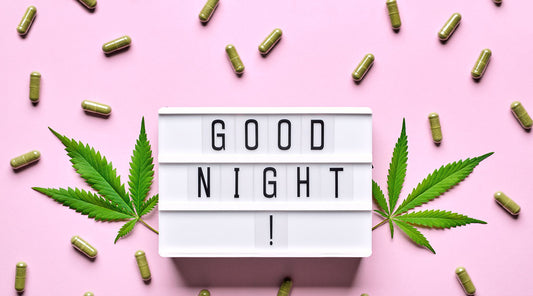Table of Contents
The body's stress response is a well-defined physiological function frequently activated by different life events. However, this response can sometimes be inappropriate, excessive, or prolonged and hinder rather than help in coping with the stressor, impair normal functioning, and increase the risk of bodily and mental health disorders. The endocannabinoid system is one of the primary regulators of the stress response. This article explores the scientific research on CBD and stress and answers the question of whether CBD could potentially help manage stress and other stress-related diseases like PTS, depression and anxiety.
Impact of CBD on Stress: Exploring the Scientific Evidence
As CBD gains traction in various industries, such as wellness and pharmaceuticals, it is essential to substantiate its efficacy through rigorous scientific inquiry. Stress management is a critical focus of this discussion. Amidst the abundance of anecdotal evidence and enthusiastic testimonials about CBD for stress and anger, the impact of cannabinoids on stress needs to be examined with empirical rigour.
- Clinical evidence published in December 2021 in the Journal of Clinical Medicine shows that CBD can safely and effectively reduce the stress response. Seven double-blind placebo-controlled clinical trials and one partially controlled study have been conducted on the effects of CBD on stress. The studies involved 352 participants and demonstrated that CBD effectively reduces stress response. CBD was also found to be non-inferior to pharmaceutical comparators.
- A large retrospective case series was conducted, which included monthly documentation of anxiety and sleep quality in 103 adult patients. It took place at a psychiatric clinic where CBD was clinically applied as a substitution for the usual treatment for anxiety and sleep complaints.
The final sample included 72 adults who reported primary concerns of anxiety (n = 47) or poor sleep (n = 25); all but three patients well tolerated CBD. Anxiety scores decreased in 57 patients (79.2%) within the first month and remained low throughout the study.
It is important to note that the clinicians and patients generally responded positively to the CBD treatment. Only four patients declined the treatment due to religious or ethical concerns regarding cannabis. Once the nature of the treatment was explained, almost all patients easily provided informed consent. Most patients appreciated the chance to try a natural alternative and avoid psychiatric medication. - A recent 2024 study conducted on 300 individuals with anxiety revealed that CBD, a non-intoxicating compound found in cannabis, can alleviate anxiety more effectively than THC-dominant products and without any side effects. This study is the first randomised trial to examine how legal, commercially available cannabis impacts (different THC to CBD ratios) anxiety symptoms.
The results indicate that THC did not exacerbate anxiety and that CBD-dominant cannabis strains were linked to immediate tension relief, which could potentially lead to long-term reductions in anxiety symptoms.
CBD's influence on stress and anxiety: Assessing both sides of the coin
After looking at the scientific evidence about CBD, you might wonder what it can do. CBD products, like CBD gummies for anxiety and stress, may affect the body in different ways.
These effects depend on dosage, individual differences, and pre-existing conditions. In order to make informed decisions about its use, it is necessary to examine both the positive and negative aspects of CBD's impact in order to gain a clear insight into its potential benefits and risks.
Positive effects of CBD
- CBD is Non-Psychoactive. Unlike THC, CBD is non-intoxicating, which makes it suitable for individuals who want anxiety relief without impairment. According to WHO, currently, there are no reported cases of abuse or dependence associated with the use of pure CBD.
- Anxiolytic Properties: CBD has shown promise in reducing anxiety symptoms. CBD interacts with receptors (serotonin) in the brain, which regulate mood and anxiety, and, according to the research, anxiety is the #1 reason why people use it in the UK.
- Stress Reduction: Research suggests that CBD may help alleviate stress by modulating the body's stress response system.
- Improved Sleep: CBD may reduce cortisol levels, which are often elevated during times of stress. Many individuals report improved sleep quality after using CBD. Products like CBD gummies for stress and sleep may indirectly support better sleep patterns by reducing anxiety and promoting relaxation.
Negative effects of CBD
- CBD's reported side effects are usually mild and temporary. The 2017 reviewed research confirms and extends CBD’s often-described favourable safety profile in humans. The most commonly known side effects were tiredness, diarrhoea, and changes in appetite or weight. However, CBD has a better side effect profile than other drugs used to treat these medical conditions.
- CBD may interact with some medications metabolised by the liver, as it may inhibit the activity of enzymes that metabolise drugs, leading to medication concentrations in the bloodstream.
- The CBD market is largely unregulated, resulting in product quality and purity variability. Some CBD products may contain inaccurate labelling or contaminants, which can pose health risks.
- Although there is increasing interest in using CBD to manage anxiety and stress, the scientific evidence is still developing. Further research is necessary to fully comprehend its long-term effects, optimal dosages, and potential risks, particularly in vulnerable populations such as children, the elderly, and pregnant women.
Allergens and allergic reactions to CBD
CBD allergies are uncommon but can affect susceptible individuals, resulting in skin rashes, itching, hives, swelling, nasal congestion, wheezing, or difficulty breathing.
Allergens in CBD Products: CBD products may contain ingredients that trigger allergies in some people, such as carrier oils (coconut oil or hemp seed oil), flavourings, preservatives, or additives. To avoid potential allergens, it's crucial to read product labels carefully.
Сross-reactivity with CBD: Individuals with allergies to cannabis, pollen, or certain foods may experience cross-reactivity with CBD due to their immune system mistakenly identifying CBD as a threat.
Contamination: Additionally, contamination with allergens such as pollen, mould, or residual solvents from the extraction process can trigger allergic reactions in sensitive individuals.
Before you start using CBD:
- ➤ If you suspect you may be allergic to CBD or any of its components, conduct a patch test before using CBD products extensively. To use the product safely, apply a small amount to a small skin area and monitor for any adverse reactions for 24-48 hours.
- ➤ If you have a history of allergies or are concerned about potential allergic reactions to CBD, consult a healthcare practitioner before using CBD products. Based on your health situation, they can provide guidance, suggest the right dosage, and, most importantly, help you make informed decisions about CBD use.
Overall, CBD allergies are rare. It is important to be aware of the possibility and take necessary precautions, especially if you have a history of allergies or sensitivities. Stop using CBD if you experience any allergic reactions, and seek medical attention.
Finding the Right Dose: Best CBD Gummies UK for Anxiety and Stress
Understanding the appropriate dosage is important to maximising the potential benefits of CBD. CBD comes in various forms, each with its considerations and administration techniques.
CBD is available in different forms, such as
- CBD oil, which is usually taken sublingually for fast absorption into the bloodstream;
- CBD capsules and CBD gummies, which offer pre-measured doses for convenient and precise consumption;
- CBD topicals. Different creams, lotions, and balms can be applied directly to the skin for more localised relief;
- CBD sprays are portable options for on-the-go administration.
Please remember that the optimal CBD dosage varies from person to person (we are all unique) depending on tolerance, weight, and symptom severity. It is advisable to start low and increase gradually as needed while monitoring for potential side effects. A healthcare professional can also provide personalised guidance on dosage and usage based on individual needs and health conditions. Choose only reputable brands that offer third-party lab testing when selecting CBD products to ensure quality and potency. By understanding the various forms of CBD and their practical use, individuals can utilise this natural compound to support their health and well-being. For more information on CBD products and categories, please explore our article 'What’s the best ways to take CBD for me?'
Summary
A review of scientific literature indicates that CBD may be a promising candidate for the management of stress. It offers a more natural approach to alleviating symptoms than conventional pharmaceuticals. Research suggests that CBD may effectively reduce stress levels and promote relaxation, with some studies indicating its efficacy in mitigating anxiety-related symptoms. However, it is essential to acknowledge that people are all unique and the effects of CBD will vary depending on individual factors. While CBD appears to offer therapeutic potential, further research is necessary to understand its mechanisms of action and long-term effects fully. Therefore, it is advisable for individuals considering CBD use to consult with their healthcare provider before incorporating it into their wellness regimen, ensuring the safe and informed usage of CBD products.
Sources:
- Enhancing Endocannabinoid Control of Stress with Cannabidiol
- Cannabidiol in Anxiety and Sleep: A Large Case Series
- Acute and Extended Anxiolytic Effects of Cannabidiol in Cannabis Flower: A Quasi-Experimental ad libitum Use Study
- CANNABIDIOL (CBD) Critical Review Report
- An Update on Safety and Side Effects of Cannabidiol: A Review of Clinical Data and Relevant Animal Studies
- Reasons for cannabidiol use: a cross-sectional study of CBD users, focusing on self-perceived stress, anxiety, and sleep problems





